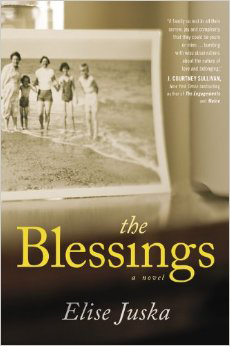The Blessings
by Elise Juska
reviewed by Victoria Zhuang
Like its down-to-earth characters, Elise Juska’s The Blessings is that glad domestic novel that doesn’t put on airs. There’s no frilly plot, no boy-meets-girl mushy-mush (okay, very little), no philosophical pontificating, no verbal tricks for effect; in sum, no manifest anxiety about keeping the reader hooked. Just a calm, compelling, gently sardonic account of some next-door-neighbor-type people who, in their humdrum way, turn out to be profoundly unique and resilient.
Three main themes of the book overlap in the title: family, grief, and grace. The Blessings are an Irish Catholic clan of grandparents, aunts, uncles, and children living in Philadelphia. To college student Abby, one of their youngest at the beginning, the inescapable size of her close-knit family is its prime feature: “They were a perennial mob at band concerts and Little League games, a discreet crowd of cameras in the living room before school dances.” Then, in a span of decades told over eleven chapters, their numbers fall. They bear the weight of misfortunes that make their family name grimly ironic: deaths, divorces, problem children, financial stress, mid-life crises, old age. But their name also refers to the Christian idea of grace: the feeling that one is blessed; the gift of one’s family; the swell of renewed hopes; and, finally, of nascent babes, the last image on the last page. So, a book of mixed blessings.
The nuance of this family portrait owes much to Juska’s adroit steering between perspectives. Though each chapter is told from the point of view of a different person in the family, the novel resists being incoherent or flattened by repetitions. Instead, like a sculpture, the central vision of the Blessings becomes more wholly realized the more it is viewed from different sides. Juska sheds her light of sympathy in equal amounts on each Blessing. Dave feels alienated from his stern wife and bulimic daughter. In later pages, following their divorce, his wife, Ann, looks back on her actions with guilt and mute sorrow and tries to warn the other women in the family not to make the same mistakes. Alex turns on his worldly girlfriend when she smiles at his family’s old-fashioned values; later, his uncle Patrick will also regret marrying a materialistic woman opposed to his Catholic upbringing. These personal dramas are seeded with epiphanies revealing common-sense wisdom in vivid ways. Patrick, for example, coming home from work, gazes at his expensive modern beachfront home and “reminds himself: Money doesn’t buy happiness. That one’s easy, but still it feels surprising each time, how deeply true it is.” Juska’s desire to show this, “the grand existing beside the routine, the ordinary” in life, animates Patrick’s lonely moment, where cliché is reborn as moment of truth.
Equally probing is Juska’s exploration of reactions to change, since “That’s what happens in families—things shift, openings appear.” Her women, more than her men, rise to life’s blows with newly discovered strength and grace; after deaths or private breakdowns of nearly all the men, it becomes a matriarchal family over time. Helen, the aging grandmother, endures her mounting losses of spouse, children, vision, and mental faculties with dignity and patience, living only to see her children visiting on weekends. She learns that “life in the end—even a long life, especially a long life—amounts to a handful of a very few things.” A similar fortitude and resignation grows in Lauren, widowed at twenty-seven; her sister-in-law admires her toughness with her children and feels “the profoundness of Lauren’s loss has made her more candid, brought other, truer parts of her to light.”
Though Juska can be sharp and witty, there’s more often a homely suburban clunk to the prose that might annoy if it didn’t feel so apt. It’s reflected in the way she describes a Blessings’ Christmas dinner: “One moment dissolves into the next—Elena taking a big bite of a snowball cookie, Meghan marching back downstairs with Elena in her arms, the kettle whistling, the baby beginning to cry.” A sense of sadness at time “dissolving,” things ending and beginning, unites these otherwise unremarkable images into a reminder of what oversees and endures them all: the soul of the family history. The effect of her writing is like the joy that all the Blessings get out of eating plain food—“macaroni and cheese, potato soup, vats of rice pudding.” The Blessings pass down tellings of each communal event to all their younger members; as Lauren realizes, marrying into the group, “this was family: to own such moments forever.” This is one of the best things Juska does: to show how things that happen in shared lives, unremarked at the moment, become the precious stuff of our histories.
Published on February 3, 2015

